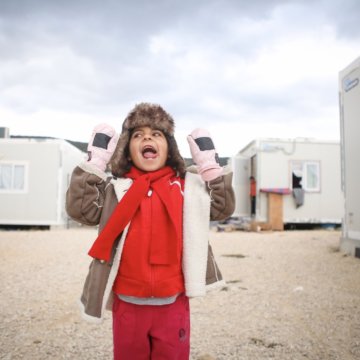- About
- Topics
- Picks
- Audio
- Story
- In-Depth
- Opinion
- News
- Donate
-
Signup for our newsletterOur Editors' Best Picks.Send
Read, Debate: Engage.
| located: | United Kingdom |
|---|---|
| editor: | Shira Jeczmien |
Between the Black Friday chaos of high street shops rolling out sales stacked on sales and shoppers across central London, the Help Refugees’ Choose Love shop opened its doors for the second year in a row. The concept is simple. Instead of channeling our money directly into corporates in return for more temporary items that might well end up in a landfill in Malaysia next year, Help Refugees has set up a shop that sells all of the essentials that a refugee might need — from coats, emergency blankets and hot meals to legal aid and mental health support. The shop has been set to represent the three main stages of a refugee’s journey: the initial survival stage, the more permanent shelter and the future of integration into a new life.
The shop comes at a crucial time. Not only are the heavy winter months upon us, and with that, many refugees are still sleeping rough in camps littered across Europe, exposed to dangerous temperatures and climate, but also the member states of the United Nations are preparing to sign The Global Compact for Safe, Orderly and Regular Migration, which was approved in July 2018 by all 193 UN member nations except the United States. However, in light of the rise of anti-immigration rhetoric across Europe, seven EU states, Hungary, Austria, Poland, Bulgaria, the Czech Republic and Croatia have now announced they will not be signing the Immigration Pact in Marrakech, Morocco on 11-12 December.
As it stands, it is unclear where the U.K. government stands in relation to the UN Immigration Pact as the country has both shown tough policies towards refugee intake (In the year ending June 2018, the U.K. has received only 27,044 applications from asylum seekers, in comparison with Germany’s 168,000, France’s 108,200, Italy’s 101,900, Greece’s 57,900 and Spain’s 37,300), and tackling its own nascent issues of immigration with Brexit, apparently, just around the corner.
Furthermore, the Choose Love shop and the work done by NGOs such as Help Refugees is fundamental to continuing the conversation around migration — particularly after it has faded from our news channels following the mass migration that the summer of 2017 saw.
So as nations prepare to sign a crucial agreement on how we move forward and approach mass migration — something that is only set to increase over the coming years and decades as climate shifts — it is initiatives such as Choose Love that not only benefit those who need it most but that keep alive the much needed conversation around migration, refugees and asylum seekers in our nations.
Image: Chose Love
